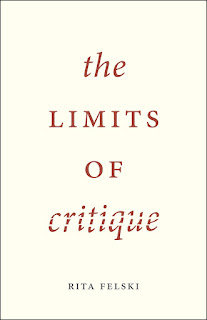Rita Felski, (2015) The Limits of Critique. University of Chicago Press, Chicago.
Summary of Introduction
Felski announces that she will be taking on critique as both mood (rhetorically speaking, and perhaps also as a stance of the author) and method, and reiterates Ricoeur's term, the "hermeneutics of suspicion,” from which so much of the present critique of critique (or “postcritique” as Felski would prefer) is framed. She identifies four key elements of critique:
1) a "spirit of skeptical questioning or outright condemnation";
2. an "emphasis on its precarious position vis-à-vis overbearing and oppressive social forces;”
3) "the claim to be engaged in some kind of radical intellectual and/or political work" and
4) "the assumption that whatever is not critical must therefore be uncritical" (4). She will presumably be tackling each of these in turn throughout the book.
At several points she makes statements which place her project on the side of what I call "opening up" critiques of critique, that is, the emphasis is not on disabling critique as a term or a practice, but on opening up space for other approaches in an academic context in which "critique" has become dominant and even mandatory. [Note: by resisting "critique" as a dominant force, she is employing element 3 of "critique," above, even while resisting tactic 4 (she allows that non-post-critical critiques can be [critical].)]
She jousts with invisible and unnamed interlocutors who sometimes take the form of straw men (e.g. on page 9). She launches into a criticism of what she identifies as the "critique of critique:" namely, the critique of critique as normally done, that is is not sufficiently critical (9). She points out that this can involve a certain posturing ("To be sure, critique has its problems, but only because it has strayed from its true path as I define it" (8)). [Debord's denouncements of "spectacular critique" come to mind]. And she points out that this “critique of critique” means that critique is the cure for critique, which leads to an endlessness of critique – which I hope she will later discuss in terms of Foucault's concept of the "Blackmail of the Enlightenment," and yet also of his sense of critique as an ethical imperative. She ends with a mention of "receptivity" as a position that is distinct from the shielded and wary practice of critique: this struck me as strange, because I had been thinking specifically of openness and receptivity as inherent aspects of critique (based on the practice at SUVA: to practice critique you need to be open to, receptive of the work of art while also keeping some distance (much like Lefebvre's in-out stance); and to be receptive to critique, you have to be open to criticism, while also keeping yourself separate enough from your artwork so as to not feel hurt, etc.]
In general this book looks quite exciting and promises to greatly expand my understanding of the nuance and breadth of "post-critique." Nevertheless I am also more and more convinced that this really could be called a "critique of critique." Felski (and others) are clearly delimiting "critique" into a particularly narrow category (just like Latour did) and then insisting that what is outside of that (namely, what they are doing) is not "critique." They thus are performing the very same definition-based move that they are criticizing. [And Foucault’s comments on how Kant opened up a “gap” between “critique” and Aufklärung seem immediately relevant]. This is all, also, situated within disciplines like literary criticism, which Felski identifies as overly saturated with critique. Much like with Latour, there is a presumption that "critique" is solely the practice of academics, and just how or why such a concept or term could be important outside of academia remains unaddressed and perhaps not even considered (but she promises to address the politics of critique in chapter four).
In passing, I noted a number of uses of enchanted language involving "spirit," or "demon," used negatively as something that possesses "critics." A promising aspect is the discussion of "mood" or rhetoric, and alternative hermeneutics beyond "suspicion."

No comments:
Post a Comment